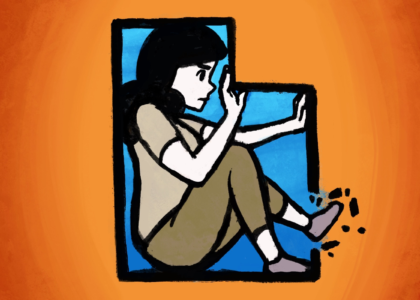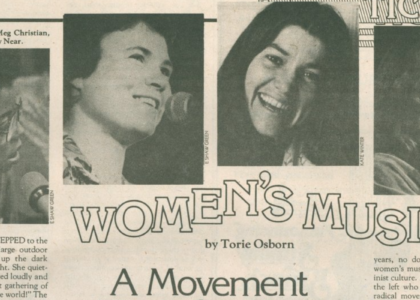“You are exactly where you need to be.”
On today’s episode we celebrate International Women’s Day!
This holiday traces its history all the way back to 1909 in NYC when women labor activists organized a day of celebration and speeches, and in doing so lit a spark which – by the very next year – leapt overseas to demonstrations and commemoration in Germany. This idea of a day for activism and celebration of women spread rapidly across Europe, reached Russia by 1917, and today is recognized all across the globe.
While popular Women’s Day traditions include giving women flowers and small gifts, it is so critical that we not let this holiday become detached from its activist roots. Yes, the day is absolutely intended to be a time for us to recognize one another’s achievements as women, but it’s also a call to action, a day when we’re all encouraged to engage in difficult conversations, to challenge institutions, and to embolden our push for gender parity across the world.
With this dedication to progress in mind, it was our thrill to be joined by, Vanessa Loder, who shared not only the story of her personal journey to empowerment, but also provided her professional guidance to help each of us unravel our inner patriarchs, set boundaries, and tap into the energy that motivates us.
Our Guest
Vanessa Loder
Vanessa Loder is an inspirational keynote speaker and sought-after expert on women’s leadership, mindfulness, stress management and sustainable success. Vanessa’s work has been featured in Forbes, Fast Company, the Huffington Post and Glamour magazine, among others. Her TEDx talk “How To Lean In Without Burning Out” has over 150,000 views, over 14,000 people have taken Vanessa’s paid online courses and her guided meditations have been streamed over 787,000 times globally.
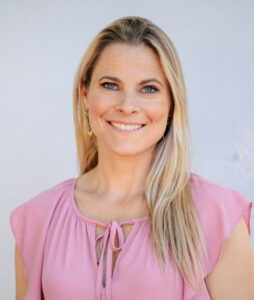
Vanessa provides in-person and online educational tools that support high potential women leaders. By distilling powerful techniques for meditation, visualization, and self-compassion into simple tools and daily practices, Loder teaches women how to quiet their minds, set boundaries without feeling guilty, let go of the pressure to be “perfect”, and get more of what they want in life. Vanessa has taught at AirBnB, Bain & Co, Castlight Health, Charles Schwab, Cisco, Flextronics, Goldman Sachs, Google, LinkedIn, Mattel, PwC, Salesforce, Stanford Graduate School of Business, StubHub!, The North Face, Uber, YouTube, and many other organizations.
After spending close to a decade working in finance on Wall Street and Silicon Valley, Vanessa felt that she had climbed to the top of the wrong ladder. Her personal transformation and soul awakening, subsequent research and work have led to thousands of brilliant, overwhelmed women finding their way back to soul.
Vanessa received her MBA from Stanford University and her BA from Columbia University where she graduated Phi Beta Kappa, Summa Cum Laude. Loder is a certified Executive Coach, trained in Neuro-Linguistic Programming, past life regression and Vipassana meditation with Jack Kornfield. Vanessa currently lives in Lafayette, CA with her husband and two children, who remind her to take “mommy time-outs” when she’s about to lose her marbles.
Visit her at vanessaloder.com.
Dismantling Your Inner Patriarch
I grew up in the 80’s and 90’s, when Second Wave Feminism told me I could do anything, be anything, and compete with the best of ‘em (meaning the boys). So I did.
When I was in elementary school, probably around 4th grade, kickball was my favorite activity at recess. And I remember the boys got to be in charge of it. They would naturally step into a leadership role, choosing captains and teams, while the girls stood on the sidelines. The boys were in the middle of all the action. The girls, on the other hand, typically milled about on the edges giggling, which actually kind of irked me. I wanted to be where the action was. And I wanted to be in charge.
Even worse in my mind, the boys seemed to have all the fun. They weren’t self-conscious, they did whatever they wanted and didn’t seem to care what other people thought. That sounded pretty good to me.
I vividly remember the first time I truly wished I wasn’t a girl. I was 10-years-old and I was on that same kickball field, standing near first base in my scuffed sneakers and patched jeans, observing the dynamics around me. Suddenly, I thought “I wish I was a boy. Being a boy would be better”. I felt it as a deep desperation, and this frustration.
The girls seemed to me like silly props, standing around trying to look cute, while the boys shaped the unfolding of the narrative. Because no one explained what patriarchy is or how it impacts our behavior and beliefs, I honestly kind of blamed the girls for acting the way they did. I looked down on the girly girls who flicked their hair and wore skirts everyday and giggled when anyone walked past. I judged them, as if their very femininity was something to be ashamed of. And on some deep unconscious level, I vowed not to be like them.
This was the first of many instances when I would sever myself from my own feminine nature in a world in which it felt too painful and disempowering to be female. That shaped my perspective for years to come.
…the girls seemed to me like silly props, standing around trying to look cute, while the boys shaped the unfolding of the narrative.
When people called me a tomboy, I took it as a compliment because I thought boys were better than girls in a lot of ways.
I assumed that’s just the way it is: that boys get to have all the power, all the fun, and do all the cool things. It seemed unfair but also a given. I never thought about how our society set it up that way, and no one ever told me either.
So, being naturally ambitious and focused, I set out to show them that I could be one of the boys, however unconsciously. Heck, I’d even beat the boys at their own game and prove that girls weren’t as weak as they thought. I’d end up carrying that mission with me from the kickball field to the boardroom and beyond…but it came at a steep cost.
I became a perfectionist overachiever, who aced math quizzes and got picked first in dodgeball, as proud of my straight A’s as my skinned knees. I became accustomed to being the only girl, accustomed do male-dominated environments. In college, at Columbia University in New York City, I played Division 1 soccer and worked towards graduating summa cum laude.
There, I’d hear men from my school make comments about how many of the women from our women’s-only sister school Barnard couldn’t have gotten into Columbia. Columbia was the last Ivy League college to admit women, starting in 1983. I’m ashamed to say I took these comments at face value and felt proud of having been accepted to the coed school, without seeing how much this attitude devalued women. I took some women’s studies classes at Barnard and was interested in women’s empowerment, but the women’s college…it also felt like a strange, separate, and less important world (as implied by those around me).
I didn’t realize how much I was buying into a system of power and a hierarchy of worthiness based on gender. I was aware of really egregious acts of sexism, I called myself a feminist and would stand up to defend women, but there were a lot of subtle behaviors and beliefs that I inadvertently adopted.

I vividly remember the first time I truly wished I wasn’t a girl. I was 10-years-old and I was on that same kickball field, standing near first base in my scuffed sneakers and patched jeans, observing the dynamics around me. Suddenly, I thought “I wish I was a boy. Being a boy would be better”. I felt it as a deep desperation, and this frustration.
In school, when we studied the accomplishments of mostly white men, instead of questioning the curriculum, I took it as further proof that the only way to succeed in this man’s world was to act like a man.
So I did. After graduation, I took a prestigious job on Wall Street where I cursed like a sailor, dressed in masculine-looking pants and sharp blazers, and once wolfed down a seven-inch Subway sandwich in under seven minutes on a dare while the senior partners cheered me on.
Pulling all-nighters and working hundred hour weeks was normal and something to brag about. Wall Street was a work hard, play hard culture in which I excelled, if I ignored the blatant sexism. As an eager new investment banking analyst, I beamed when a male coworker said one of the managing directors mentioned my name—until I found out it was while he perused company photos listing who he wanted to have sex with.
That day, I muzzled my shock, repulsion, disillusion, and sadness, but something in me began to crack. In subtle and not-so-subtle ways, I was being told where my value lay.
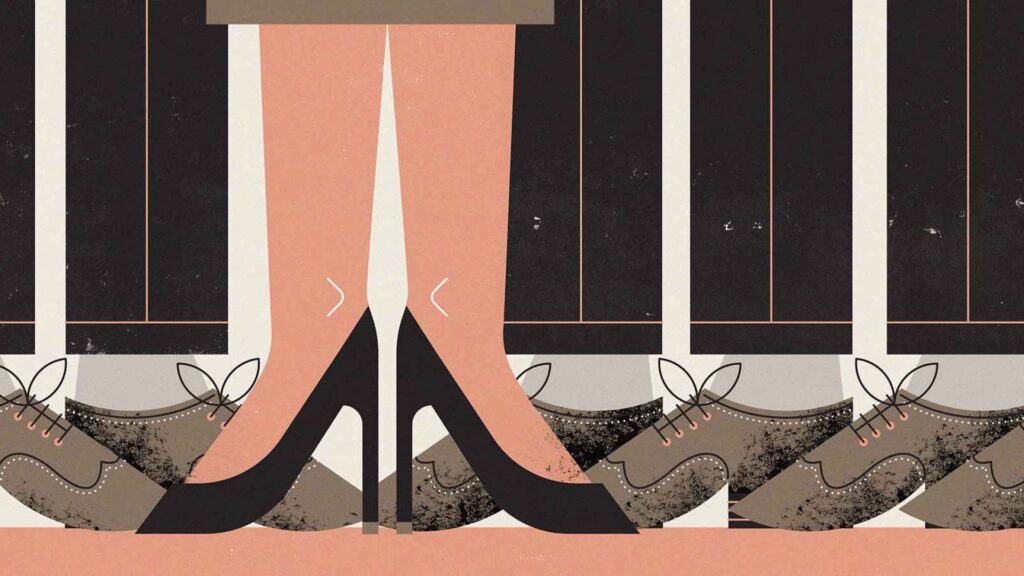
Still, I put my head down, convincing myself I could prove my worth through more prestigious jobs, business school and more. I tried to do what I’d done on that kickball field as a little girl: attempting to beat the boys at their own game. I spoke up in meetings more than my male colleagues. I volunteered for projects, I worked hard. I earned the highest bonus of any associate in my peer group, followed by more promotions and plenty of money. I’m embarrassed to admit that I even went to strip clubs to show I could hang with the boys.
There were inklings of another life, an alternate existence with different possibilities.
When I graduated from college, I thought about joining the Peace Corps but went into investment banking instead.
When I felt burned out from my job, I got into yoga and dabbled in meditation but couldn’t seem to make it stick.
Overall, my life was ruled by achievement and this deep desire to prove my worth.
I was chasing the wrong kind of power.
But then, in my early 30’s, something substantial began to shift inside of me. It all started to feel hollow. Like a charade I no longer wanted to act out. A game I’d gotten really good at, but didn’t actually enjoy.
I began to do some soul-searching, looking for answers.
I began to wake up.
I hired a coach, originally because I was scared to get engaged to my then boyfriend (now husband!).
After I overcame some of my fear of marriage and we got married, I told my coach it was time to examine my career. “I just don’t love my job.” I told her. “I like the people, it’s intellectually stimulating, but I look at the partners and I don’t really want that. I want something with more fulfillment and meaning, where I’m having an impact, but I have NO IDEA what that is or how to find it!”
As I began exploring what I wanted to do next, I became fascinated with neuroscience, mindfulness, alternative healing modalities like hypnosis and past life regression healing, and optimal performance and behavioral psychology.
I had what can only be described as a spiritual awakening. While attending a Women’s Meditation Day (my first day-long meditation retreat) there was this moment late in the day – we’d been meditating from 7am till 5pm, and around 3 or 5 o’clock in the afternoon I did this thing I think a lot of beginner meditators do. We were in the middle of a sit. Everyone had their eyes closed meditating, with the teachers up front on a dais. I peeked my eyes open and looked around the room like are all these people really still meditating?! It’s been hours of this! How are they doing it? And in that moment, when I glanced around the room, I happened to see one of the teachers sitting up on the dais, on her cushion. She had grey hair with these beautiful white streaks in it, and she was just emanating this powerful, palpable presence. I looked around the room and I could feel the energy of all these women gathered together and this thought came through me in that moment which was: Oh my gosh, I’ve been chasing the wrong kind of power my entire life. The power I really want? It’s in this room right now. It’s in all of these women. It’s in these teachers. It’s in that one teacher with the grey hair, with the streaks of white. And it’s in me.
…pulling all-nighters and working hundred hour weeks was normal and something to brag about. Wall Street was a work hard, play hard culture in which I excelled, if I ignored the blatant sexism.
I spent the next 10 years exploring ways to connect with my Inner Self, with what I might call my soul—which I now believe is neither feminine nor masculine, but has aspects of both integrated in its wholeness.
I realized how deeply I’d repressed my feminine nature to make it in a man’s world. And also how I was trying to “beat” the patriarchy by climbing the wrong ladder rather than owning my feminine power, claiming my sacred masculine power, and integrating both into my own wholeness. Instead, I had been trying to suppress my true self.
Part of my fundamental issue, I think in hindsight, was that I was trying to beat the patriarchy without realizing this would leave me inextricably linked with it. And also without realizing this couldn’t occur without me internalizing patriarchy itself. So instead, what I’ve tried to do is integrate my feminine and masculine sides.
Excavating my own feminine power has been an incredible journey—discovering what it means to treat myself with self-compassion instead of harsh criticism, dismantling old beliefs about success, work, and marriage, finding the courage to do what I want instead of what I “should” do. I’ve learned how to be a powerful woman who leads with love, authenticity, vulnerability, and collaboration rather than competition, with playfulness rather than seriousness, with pleasure, rest, & renewal rather than grueling self-control, unwavering exertion and forced motivation.
Choosing these qualities over and over and over again has taken tremendous courage. It’s been a continual act of re-programming my own belief structure at the very core of my being to refuse to believe the ingrained lies that these qualities are a sign of weakness, and instead recognize that they augment my strength.
I felt so much pain in my heart, so much confusion as I tried to connect with my feminine power.
How do you access a place that has been buried deep in the soil of your soul?
You excavate it, one shovel full at a time. Removing the lies, distortions, beliefs, and fears that have accumulated on top of this precious treasure. You have to get your hands dirty, feeling the muck and grime, while remaining focused on the reward that you know lies underneath.
I have felt the rage and grief of thousands of women. Held back, pushed down, told we can’t do or be or have what we want. It all felt so unfair, so unjust.
I have screamed so loud my throat became hoarse and I have sobbed so hard that my body shook. Why are women treated so poorly? How can I stop treating myself so poorly? And how can we change this? All of it. Forever?
In the midst of all this unraveling, there was no anchor or guidance to rediscover myself. No one ever taught me how to fully occupy my feminine power and my female body in a way that felt true to me.
What does that mean? How could I do that? Who are the role models for that?

My body became my teacher, giving me signs when things felt “off” through its heaviness and constriction, and giving me guidance when things felt “true” through its open, expansive, excited feelings. I paid attention to the messages it sent me.
My heart became my wise confidant, unceasingly steering me towards my true self.
My heart has allowed me to access this sacred, untouched place within myself that cannot be influenced by people pleasing or doing what I “should” do. My heart, I learned, is the house of my deeper truth.
My womb, the scariest of these three places for me to approach, taught me about healing and my own creative power.
I spent time releasing the shame and guilt I held in my womb—finally getting it, that I felt all this shame and guilt because other people told me to, because they, too, sensed the power that is held within my womb and some of them wanted it for themselves or at least didn’t want me to have it. And so I began reclaiming my sacred womb power and channeling it for my own good and creative expansion. The womb is a power center in our bodies. Yes, we can use it to literally create new life, but also to create new projects for our work, to birth ideas, to channel our creative and sexual energy.
As women, we have been told to deny our pleasure and our desires. Many women repress their desires—and I don’t mean just sexual desires—we make our desires go dormant, shame ourselves or allow others to shame us for having needs and passions. Reclaiming your sacred womb power is about reclaiming pleasure, desire, and sexual energy as a creative life force that can feed and fuel you and others.
And when I talk about reclaiming pleasure and owning our desires, I could be referring to something as basic as allowing ourselves an hour to sit on the couch and just relax in the middle of the day. Your desires could include taking a painting class, lounging outside on your deck reading a magazine with a cup of tea, making yourself a smoothie that you drink out of a fancy glass (that’s one of my favorites!).
As I uncovered my true feminine nature, I began to forge my own path forward in an even deeper way. I was no longer following the rules laid out by society, but instead tuning in to an inner authority, that of my body, heart, and intuition. That of my soul.
I made dramatic changes in my life to be more aligned with my true values, such as pursuing work that fed rather than depleted me. I felt waves of joy, expansion, and alignment that I didn’t know were possible as I began living a life that felt more true to ME.
But even as I did this deep work, and made these sweeping changes, I noticed old patterns surfacing.
I have felt the rage and grief of thousands of women. Held back, pushed down, told we can’t do or be or have what we want. It all felt so unfair, so unjust.
Staying in this awakened headspace wasn’t easy. For example, I would work in a way that was punishing and cruel towards my needs—not resting enough, pushing through at my computer for hours a day even when my body cried for mercy, not even getting up to go to the bathroom. I knew I should be nourishing myself and making sure my needs were met, but it was as though I had an Inner Patriarch who was squatting in my house and refused to leave, like a stubborn tenant in a rent-controlled building.
People talk about “crushing” it at work, but what if the point isn’t to “crush it”, but to savor it?
I began to wonder if there was a better way to live. Could I be ambitious and productive without rushing, anxiety-fueled, through my days? Could I realize my own dreams instead of satisfying everyone else’s perceived expectations? Why was I constantly meeting other people’s needs but ignoring my own, only to wind up resentful and exhausted? How could I balance work and family, health, and hobbies? How could I honor my ambition and nourish my soul? I had been so busy following this prescribed path that I honestly had no idea how to forge my own way forward, even once I realized I needed to create change.
Thus began another phase of my journey; I needed to figure out how to pursue big, bold dreams and desires without sacrificing myself. I wanted my Inner Patriarch to leave the building and be replaced by a healthy version of masculine energy that would help me take action and propel things forward with greater ease.
As I began exploring my relationship with what I call the Divine Masculine, or the healthy expression of masculine qualities, I felt so much longing and a deep, deep sadness. When I think about how much I’ve missed receiving or experiencing the healthy masculine in my life, it brings me to tears.
I realized that not only had I repressed my feminine power, but I had scorned the masculine because of my negative experiences in patriarchy.
I didn’t revere or cherish the masculine. I feared it. I hated it. I wanted to crush it.
And it almost ruined my marriage, causing me to be consumed by overwhelm and resentment as I didn’t know how to receive support. My husband and I joked in couples therapy that I was projecting the patriarchy onto my husband…if he came home from work and I was in the kitchen prepping dinner and dealing with the kids, and I heard him crack open a beer…a rage would fill my body and I’d lash out at him with the anger of 1,000 medusas.
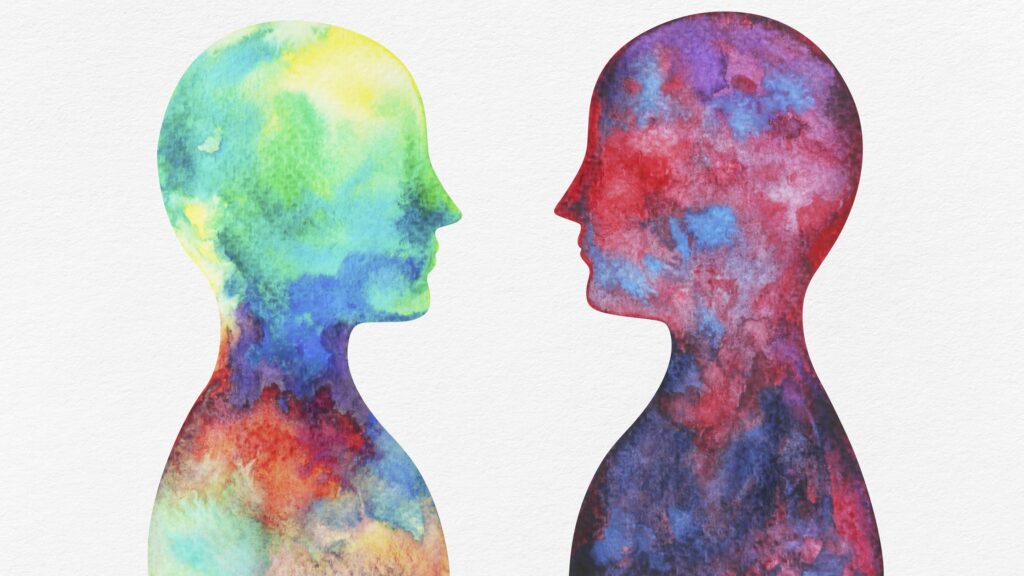
It was a complicated situation to unpack, because at times there were real inequities in our marriage that needed to be addressed, but I also brought a whole lot of anger and pain to the situation that had nothing to do with him.
I explored the lineage in my family and saw how the women disrespected the men—how the women were filled with resentment at being shackled, and how this showed up as scorn for men and asserting complete control in the household (supposedly a woman’s domain). I noticed how I did this myself, micromanaging my husband at home and not allowing him to do things his way, treating him like some poorly qualified, inept employee who was never up to the task.
Once I became alert to it, women’s rage at being treated as subservient showed up everywhere. I started noticing all the snarky comments other wives and I made towards our husbands; shaming them, belittling them, controlling them, bossing them around, especially when it came to the house and kids. I realized the same way men had not empowered women at the workplace, we were not empowering our husbands at home.
My husband was scared of doing something wrong, scared of my constant disappointment. This was not a recipe for intimacy and connection, or joyful partnership.
I started to really look at my own feminine shadow. The parts of myself that were so wounded, they wanted to wound and blame men.
I started to look at the parts of myself that refused to acknowledge or receive the healthy masculine.
I noticed all the ways I’d been a lone warrior, trying to single-handedly take care of my own needs, not allowing myself to receive support. For many women, it’s easy to take care of others, but we are often not very good at letting others take care of us.
And so began the next phase of my healing journey…discovering and saying yes to the healthy masculine both within myself, and being able to honor and receive it from others.
What does that even mean, to access the healthy masculine?
One woman executive I coached told a story of riding her bike up a very steep hill in Marin, CA. She had given up and was about to start walking her bike when this man came up behind her and said; “You can do it!!!” And, with her consent, he then put his hand on her back to push her along, while simultaneously peddling his own bike one-handed. He literally pushed her up the hill with one hand for the rest of the way, their two bikes riding in tandem, side by side. That is an embodiment of the healthy masculine in action.
There’s a chart I created with my colleague Sherri Lassila to name some of the unhealthy vs healthy expressions of masculine and feminine energy:
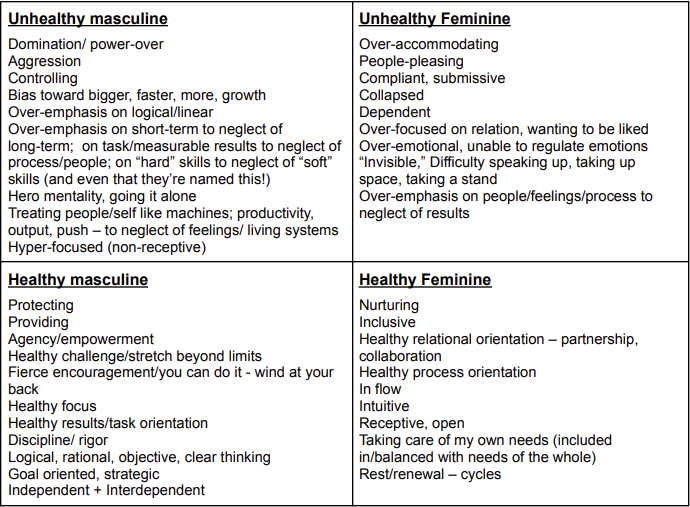
As we begin to pay attention to the ways we have undervalued the healthy feminine and overvalued the unhealthy masculine, we can create positive changes in ourselves and the world at large.
When we let go of our rage, our fear, our grief, and we begin opening up to new possibilities for how we can each show up for ourselves, each other and the world, magic happens.
Now I teach other women how to access their feminine power, and be open to receiving healthy masculine support.
So here I am. A Stanford MBA Spiritual Teacher.
And, having shared my own personal story and journey with patriarchy, I’d like to also share some useful tools and frameworks with all of you listening in hopes that you can experience some of these concepts and positive changes too.
When I lead coaching calls and ask women to try to tap into the feeling of being supported by the masculine, I’ve done an embodiment exercise where I have them stand up and imagine they are propelling someone else (put hands in front of you, palms out and push, imagining you’re pushing someone else forward). Many women can easily identify with this feeling, they are very used to propelling others.
Then I have them imagine propelling themselves, giving another push into the air in front of them and just noticing how that feels. For me, when I do this and imagine propelling myself, it’s a much more forceful push, it’s not gentle at all. I don’t know how to propel myself in a more gentle way, it’s something I’m still learning how to do.
Lastly, I have the women imagine someone is standing behind them, pushing their back at their shoulder blades, gently but firmly propelling them forward.
Take a moment and see if you can imagine that; almost arching your back and imagining someone’s gently but firmly propelling you forward. Notice if that feeling’s familiar at all or not.
Many women cannot even imagine what it would be like to be fully held and supported. When we get to this last part about feeling supported and propelled by others, the women draw a blank. They can’t think of any examples of feeling this in their own lives.
Some of the women could only connect with this feeling of being propelled by an outside force when they think of nature, for example one of them could imagine the feeling of being propelled by the wind on her kayak. Another felt the ocean carrying her forward.
That brings us to the theme for today:
The Inner Patriarch.

In my own life, as I’ve mentioned, I noticed how I’ve adopted behaviors, beliefs and patterns of interacting with others that we’ve adopted but feel as though they were forged by forces greater than me.
Have you ever had an experience where you can see where you’re stuck or how you’re doing things that don’t make you happy, but you can’t seem to STOP yourself!? I have. As someone who likes to believe I have a choice in how I show up and what my life becomes, I was really curious to get to the bottom of this. If certain behaviors don’t serve me or others, why do I persist in them? Why, I wondered, was I doing things that made me resentful? Why was I feeling so much pressure to be perfect – physically beautiful, successful in my career, the ideal mom and partner. I wanted to know why this happened (which this podcast helps us all understand), but more importantly, what I really wanted to know was how could I change these outdated beliefs and patterns within myself? How could I get out of these old ways of being and create the life I really want?
One big piece of the puzzle that I’ve experienced is learning how to identify and systematically dismantle that pesky Inner Patriarch so I can step into my full-feminine balanced power, feels my worthiness as a woman and a human being without trying to earn it, and make choices that are aligned with my personal values in how I live and work.
We can do this regardless of gender or sexual orientation, you may have different themes or beliefs that impact you, but we’ve all internalized something. We’re all impacted by forces greater than our individual childhood, including our broader culture and ancestral lineage. Being raised within patriarchy, many of us have internalized beliefs and ways of being that do not feel good.
It’s time to let those things go.
Whether you’re a man, woman, transgender or non-binary, you can learn to identify some of the forces that seem to go against what you authentically desire or what truly makes you happy.
This topic is so near and dear to my heart, and I feel like I could talk for 7 hours about it…but for today, I’ve chosen 3 themes to dive into more deeply….and if you want to hear more, just leave a comment or let Amy know…who knows, maybe we’ll do a sequel 😉
The first pattern I’d like to discuss when it comes to dismantling your Inner Patriarch is around Women and Human Giver Syndrome.
How can you stop thinking of yourself as the fixer of the world and instead set boundaries and say ‘no’ with greater ease, without feeling guilty.
There was a fascinating longitudinal study conducted on Richard Schwartz’s IFS (Internal Family Systems) based psycho-therapeutic intervention that was done at Brigham and Women’s Hospital at Harvard Medical School, in Boston. Basically, what they did is they took a group of (mostly Catholic women) who were suffering from rheumatoid arthritis, and they treated them with IFS therapy, which is an evidence-based model of psychotherapy which suggests our mind has multiple inner parts that contain valuable qualities, and our core self knows how to heal and allows us to become integrated and whole. So, for example you have these protective parts inside of your mind that might say “Don’t apply for that job! What if you don’t get it?” and those parts are protecting some of your more wounded parts, maybe a part that feels like it’s not good enough, and your core self can help create healing and integration within your psyche. Within this study, participants received 6 months of IFS therapy with a focus on their arthritis, so they tracked and measured the number of joins impacted, the amount of pain, and they also tracked the amount of anxiety and depression in the participants and the control group.
The results showed that an IFS-based intervention had positive effects. It reduced pain and depressive symptoms, while improving physical function and self-compassion. After 6 months, the IFS group showed vast improvement vs the control group and that followed for a period of months afterwards, some went into complete remission. Now here’s the part that’s really interesting and that I think has to do with dismantling your Inner Patriarch: these Irish Catholic Boston mothers had been taking care of everyone else but themselves, and the majority of them ended up using the IFS treatment protocol to identify and communicate with a part that believed it needed to take care of everyone but themselves. When they focused on the pain and asked it questions, it became clear that the pain was a reaction to hating the caretaking parts because their bodies wanted to have a life, wanted to assert themselves, wanted to have more balance and justice in their lives. As they worked that polarization out, the pain actually changed because these other parts didn’t have to keep using pain to get attention. When they shifted this, their physical bodies healed! That study just blew my mind because when I heard about it and heard “Oh, Irish Catholic mothers who have a caretaking part, and once they work with and heal the caretaking part their arthritis, their pain, their anxiety and depression go away.” I heard that and said that, to me, is an offshoot of patriarchy. Yes, we each have our individual childhood pain and trauma, but the commonality of the symptoms and commonality the wounded parts of these women had, that points to a larger theme.

If you want to learn more about Richard Schwartz’s and the IFS-based therapy model of healing, I recommend his recent book which is called No Bad Parts or you can listen to him describe it on a podcast episode in ‘Insights on the Edge’.
So, women can find it challenging to take a stand for their authentic needs because of a deep (often unconscious) conditioning that we are here to serve others. We have become what Kate Manne calls “human givers” rather than human beings. In Down Girl: The Logic of Misogyny, Manne defines “human givers” as a class of people who are “expected to offer their time, attention, affection, and bodies willingly, placidly, to the other class of people, the ‘human beings.’”
If you want to read a great book on women and human giver syndrome, I highly recommend the book Burnout by two sisters, Emily Nagoski PhD & Amelia Nagoski DMA. In that book, they write:
“Human Givers must, at all times, be pretty, happy, calm, generous, and attentive to the needs of others which means they must never be ugly, angry, upset, ambitious, or attentive to their own needs. Givers are not supposed to need anything. If we had set out to design a system to induce burnout in half the population, we could not have constructed anything more efficient. Your body, with its instinct for self-preservation, knows on some level that human giver syndrome is slowly killing you. That’s why you keep trying mindfulness and green smoothies and self-care trend after self-care trend, but that instinct for self-preservation is battling a syndrome that insists self-preservation is selfish so your efforts to care for yourself might actually make things worse, activating even more punishment from the world or from yourself because how dare you?”
The book goes on to say that Human Giver Syndrome is the framework on which the second shift hangs. The shrinking, but ongoing inequality in the time and effort spent on childcare and housekeeping between men and women. 40 hours per week for women vs an hour and a half for men, globally. Even in the most balanced nations – which include the U.S., U.K., and Canada – women still spend 50% more time in this unpaid labor. And for many women and men, success isn’t just the constant hustle, corner office, working on weekends, endless Facetime or Zoom meetings, pushing others aside to get to the top, or taking on a tough masculine persona.
In my book, The Soul Solution, I talk about the myth of the gold standard, in that women feel tremendous pressure to succeed in all aspects of our lives. The result? According to a 2016 study published in ‘The Journal of Brain & Behavior’, women are twice as likely to suffer from severe stress and anxiety as men. And according to the United Nations, women are doing nearly three times as much unpaid domestic work. Women’s sacrifices are not paying off; while women outnumber men in college, and account for about 52% of middle managers in the U.S., only 18% of the highest-level leaders and less than 5% of Fortune 500 CEOs are female. COVID has contributed to this issue by making women’s lives even more complicated and hectic as women are disproportionately impacted by the current global crisis and face additional strain in caregiving and homeschooling. As women transition into the “new normal,” this problem of being overworked and under-fulfilled still remains.
The solution to Human Giver Syndrome may be to raise everyone to be more caring and communally focused. As the Nagoski sisters suggest in their book “what if, just what if we raised everyone to be a version of a Human Giver? What if we assumed it was every persons moral responsibility to be generous and attentive to the needs of others? What if we assumed no one was simply entitled to have what they wanted from another person, but everyone was supposed to try to help others wherever they could. No one would sit watching TV while the other cooked dinner and did the dishes, unless both had mutually agreed that was worked best for both of them. No law would allow anyone to take control of another person’s body because no one would expect that, right?”
Getting back to my earlier point of integrating a healthier version of the feminine and the masculine within ourselves, much of our inner work as women is to allow ourselves to be more selfish, to pursue out pleasure, to claim our desires, to practice self-compassion and to luxuriate in leisure. I often feel that leisure and being in flow, allowing yourself pleasure and desire – these are empowerment issues for women. I remember travelling in Turkey years ago and seeing all the men sitting in the cafes playing card games while the women toiled with brooms, sweeping the floors, baking the goods and selling them in the cafes. And I remember it really struck me like wow, the men are lounging around a lot! And all the women are hustling and bustling around them. So as women, it’s time for us to claim our rights to relaxation and rest. And as men, I think it’s time to step more into the role of Human Givers, to think about how you can support others.
…Some of the women could only connect with this feeling of being propelled by an outside force when they think of nature, for example one of them could imagine the feeling of being propelled by the wind on her kayak. Another felt the ocean carrying her forward.
Many years ago a woman on one of the retreats I led told this story. She said her husband was in charge of picking their son up from daycare the day before and he hadn’t realized that the schedule had changed. He told his wife over dinner that night that he’d accidentally arrived forty-five minutes early for pick-up. She said “So, what did you do for those forty-five minutes?” He replied “I got a beer.” “You got a beer?” she said incredulously. “At 3 o’clock in the afternoon! Before picking our son up from daycare?!”
“Yup,” he answered.
As she relayed this story, every single woman at the retreat shook her head and sighed audibly. I paused the discussion. “What would you have done with forty-five minutes to spare?” I asked the group of mothers. “What would any woman have done?”
Their answers varied in specifics, but all had the same ‘taking care of business’ theme. Some of them said:
- I would have worked in my car
- I would have bought diapers online
- I would have gone grocery shopping or shopped for household stuff on my phone
- I would have made calls, scheduled appointments, run an errand nearby
Every mom in that room said it would never have crossed her mind to get a beer (or even a pedicure!) if she had extra time. She would do something “productive”.
What if, instead of judging her husband, we began questioning ourselves (with compassion) and asking, “Why am I not taking time to relax by myself?”
Once you’ve recognized the temptation to overwork, overdo, and over-commit, it takes courage and commitment to take your foot off the gas. If you’re an ambitious woman, like me, it’s not going to be easy at first. If you live in the modern, fast-paced world and not in a cave in the Himalayas, it’s also not going to be easy. It’s surprisingly difficult to allow yourself to do less. To stop fixing everything and everyone. To drop the to-do list like a hot potato and lounge around like a couch potato instead. Your very identity might be shaken to its core. And that’s ok. In fact, that’s good. It means the unraveling of your Inner Patriarch has begun.
A big part of making what I call the ‘Soul Solution’ work is learning how to surrender and trust that the universe has your back. Sometimes, the best thing to “do” is nothing. Sometimes when you’re trying to do nothing it’s going to be like not scratching and itch. Maybe you look around your house and see the dirty clothes on the floor, you really want to pick them up, and you have to resist the urge and let yourself nourish yourself and relax and do nothing. As more of us shift our internal patterning, we’ll change the broader cultural narrative, making it easier for future women to do less and have bold, ambitious visions for their lives.
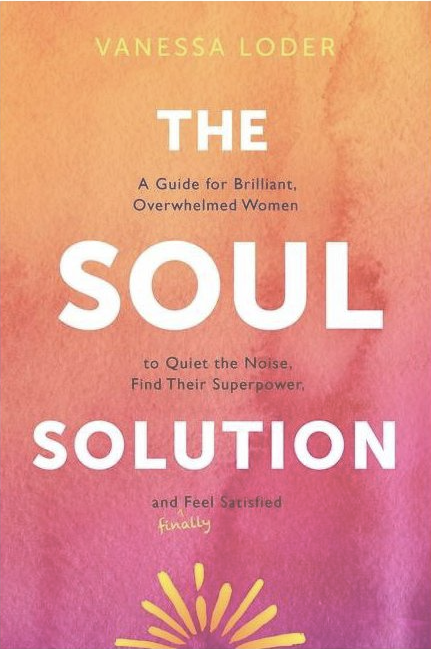
One that that has helped embolden me to make these types of changes in my own life is to understand the research. Whether it’s volunteering for a committee or agreeing to pick up the slack for a sick colleague at work, research conducted by Lise Vesterlund, Ph.D., professor of economics at the University of Pittsburgh, shows that women are more likely than men to:
1. Volunteer to do non-promotable tasks.
2. Be asked to do non-promotable tasks.
3. Say ‘yes’ when asked to do these mundane tasks.
Women are overcommitted in a lot of ways, and tend to feel more of a psychological burden when asked to do someone a favor. Part of Vesterlund’s research showed that while considering how to respond to a request, 31% of women felt worn out, were worried, had a difficult time saying no, or were afraid of being perceived as someone who is not helpful. In comparison, less than 10% of the men felt this way. Men, in contrast, were concerned with whether it was a good use of their time, would it help their career, and would the person owe them a favor in the future.
That research I found incredible eye-opening and powerful. There are some interesting things I found when writing my book about women’s time and space, having time and space for yourself. It turns out that protected time signals power. Here’s another passage from my book:
“Historically, a woman’s job was to protect men’s time from interruption. Think of the “good” secretary or wife, who acted as gatekeeper so that the man could relax in peace with his thoughts. Sociologist Christena Nippert-Eng writes about how uninterrupted time is the territory of the advantaged. She has said:
To be interrupted is to exist in a “state of dishonor.”
Implicit in the notion of Human Givers vs. Human Beings is that there’s almost an expectation that women’s time can and will be trampled on by the demands of others. This is not ok. Often, this is not from any intentional ill will. It’s an ingrained absence of boundaries, resulting from a kind of trickle down patriarchy (I just coined that term). When we respond to interruptions by offering our help and availability, we encourage more intrusions on our time. Go to any child’s birthday party and watch how many times the mothers are interrupted in mid-conversation compared to the fathers. It’s astounding, even among dual-income couples.
…if we want to change the channel, we have to stop watching the same old movie. We have to insist on a different movie or leave the theatre.
Think of your team at work: how comfortable are you interrupting someone who is more junior than you vs. interrupting your boss? Your question had better be good if you are interrupting someone “important,” right? In meetings, women–of which there are fewer in the room already–are interrupted far more often than men and are less likely to be given credit when we do share our ideas. Can you see how more frequent interruptions to women demonstrate an implicit power differential? Our time is more fragmented, as a result. The simple truth is that other people will continue trampling on your time until you put up a gosh darn fence.”
In my group coaching programs and corporate workshops, I often coach women leaders on how to say ‘no’ without feeling guilty. Today, I’d like to share a few quick tips with you!
Seven Tips to Help You Say ‘No’ with Ease

1. Start small.
To begin with, pick something small that you would like to say ‘no’ to or set a boundary with, then see how it feels to get that one thing off your plate. Once you’ve refused to do something small, you’ll see that people don’t hate you, life goes on, and the world continues turning. Next time it will be easier to say ‘no’ to a bigger request.
Think of it like building up your saying ‘no’ muscles. Maybe the first step is starting to leave work an hour earlier on Wednesdays to make it home for kid’s soccer game, or telling your team and making it clear you’re not going to be online after 8pm or on weekends to work. I recommend no going back on the boundary you set. Really hold it and stick to it.
You will probably get push back because people aren’t used to boundaries being set, they might even judge you at first, which is another reason to start small and build from there.
2. Trust your body.
If you receive a request and then you feel really heavy in your body or tight or constriction or it just feels wrong, then you might want to consider saying ‘no’. On the other hand, if you feel light and free when considering someone else’s request, then maybe it’s something you actually want to say ‘yes’ to. Learn how to recognize your own internal signals and your body wisdom, and ignore the pressure that others put on you.
One of my really good friends had a situation where her boss at work asked her to be on the board of a Non-Profit for Childhood Development. She debated it for weeks, struggling with the decision. The higher ups at her firm supported the cause, it would be good networking, and she did believe in it, but she also had limited time. She was already stretched really thin, and after the Trump election she really wanted to do work to support minority women. The Board Volunteer opportunity felt heavy in her body. She ended up saying ‘no’ to it even though that was really scary and hard because she didn’t want to disappoint her boss.
She called me right afterwards and said “Vanessa, the minute I said ‘no’ it was a like a weight was lifted from my body. I felt so expansive, and open, and happy again.”
Your body really does have tremendous wisdom inside of it. If you start to tune into your own inner signals, you’ll get important information about what to say ‘yes’ to and what to say ‘no’ to.
3. Give yourself permission.
Recognize that it’s normal to be worried about someone not liking you if you refuse a request. Feeling guilty or afraid that people will not trust you or value your opinion is also normal. Many times these are the reasons we keep saying yes, even when we’re exhausted and don’t have the time. Some of these fears and beliefs won’t go away overnight, but you can choose a new outcome by saying ‘no’, even though it feels scary and starting to make space for what you want to come in.
Give yourself permission to feel the fear of the guilt and do it anyway.
I recommend writing yourself a ‘permission slip’ sort of like what you used to get back in school to go on a field trip only this one will say “I give Elia permission to not make everyone happy.” Or “I give Vanessa permission to rest.’ Or ‘I give Vanessa permission to say ‘no’ and get her needs met.’ It sounds really silly to write yourself a permission slip, but it actually really helps you shift something inside psychologically so you can try that for yourself as a tool if you want.
4. Don’t apologize.
You did nothing wrong. There’s no need to say, “I’m sorry,” when you’re setting a boundary. Instead, I recommend you start with appreciation for the person you’re talking to and then end with your “no.” For example, “I appreciate you for reaching out and can see that it’s important to you to find support as you build this business; however, I won’t be able to get together in person at this time.”
5. Be short and confident in your in your boundary setting.
If you wobble, people will sense it and push back to try to change your mind. People actually respond to your guilt. You want to be clear, concise, and confident when saying ‘no’. For example, “I’m not going to be able to meet you for coffee this week; thank you for the invitation.” You don’t need to explain why you’re saying ‘no’. You don’t need to elaborate.
Too often, we trap ourselves by over-explaining and then we end up back peddling on our boundary or leaving the door open. I know I’ve done that, like Oh I can’t make it work, but maybe next week! I throw that in at the las minute and then go Why did I do that?!
Try saying: “Something came up, I won’t be able to make it [full stop].”
Rather than: “Oh, I’m so sorry — I have another thing that day, and it probably won’t end in time, but maybe it it wraps up early then maybe I can still make it…..” That’s leaving the backdoor open for them to come back at you with more requests. You want to be clear and confidant in your ‘no’.
6. Start a NO Club.
Peer support is incredibly powerful. You can get together with a group of friends and discuss what everyone wished they’d said ‘no’ to in the last month. Then ask the group to hold each other accountable in situations going forward. Check in at least once a month, or perhaps every week in the beginning, like What did you say ‘no’ to this week? Here’s what I said ‘no’ to!
It really does help you build that confidence to say ‘no’ when you have people cheering you on in your ‘no’.
7. Focus on your YES.
It’s a lot easier to say ‘no’ when you have a clear picture of what you want to say ‘yes’ to instead. For example, if you’re invited to an event over the weekend that you feel like you should attend, but you’d rather stay home, take a bath, and read your favorite book, picture what you’ll be doing as you go to tell the person ‘no’ and it’ll make it stronger and easier for you to say ‘no’.
Those are some of my tips for how to say ‘no’ without feeling guilty. I have a cheat sheet with some expressions and guidance on how to turn down people’s requests linked here.

I know that for me personally, once I discovered the research about women being asked to do more non-promotable tasks and feeling guilty when they said ‘no’, it became easier for me to start setting boundaries, saying ‘no’ and also asking for support.
A simple solution at work for when women are asked to do more non-promotable tasks, can be share that research with your boss or manager. You may even want to suggest that going forward, these types of non-promotable tasks (like organizing someone’s birthday party and taking notes in a meeting) should be randomly assigned by drawing names from a hat, or by rotating who’s responsible until everyone does it so it doesn’t fall on women more often.
Most importantly, remember that whenever you say ‘no’ to something you don’t want to do, it creates space for your YES to come in. And believe me, that ‘yes’ is worth the wait!
Alright, that was a little (a LOT) on Human Giver Syndrome and how to set better boundaries so that you can nourish yourself rather than always take care of others. The second theme I want to address when it comes to dismantling your Inner Patriarch is what I call…
The Success Myth
Most of us know Arianna Huffington as the co-founder of ‘The Huffington Post’ and the founder and CEO of Thrive Global, as well as one of ‘Time Magazine’s’ Most Influential People. According to our traditional definition of success, Arianna has ‘crushed it’. To quote from my own book:
“Arianna has crushed it according to our traditional definition of success, but she also worked so tireless that she woke up in a pool of her own blood. She’d been pushing herself so hard that she finally collapsed, hit her head on the corner of her office desk, and when she awoke on the floor with a gaping headwound she was struck by a single thought: This is success? Waking up in a pool of your own blood? “
Arianna had followed the old rules based on the traditional paradigm of success, cranking a shard as possible to climb the proverbial patriarchal ladder, but this incident changed her perspective. She quickly became an advocate for re-defining success and even wrote the book Thrive encouraging people to cultivate more holistic and balanced lives.
Now not everyone has a turning point as dramatic as Arianna’s. Instead, what I have found from working with women over the past decade is that most of us have a subtle but persistent sense that something is off. We find ourselves thinking things like I just know in my bones I’m meant for something more. I feel a vague sense of dissatisfaction that I can’t really pinpoint. Or This success isn’t sustainable.
Those revelations, what I call ‘Soul Whispers’, may not be as resounding as literally being hit over the head with the truth, but these quiet inklings about our notions of success matter. Part of the ‘Soul Solution’ process is learning to recognize and honor your own subtle cues and sophisticated ability of discernment. It’s also about recognizing that not all the obstacles are internal. Maybe things feel off to you because the system itself is off? Not because something is wrong with you. Maybe you’re beginning to sense that this play was not written for you or in your favor.
So what is ‘The Success Myth’?
For ages our culture has embraced an outdated definition of success, an obsession with productivity, and wearing ‘busy’ as a badge of honor. Many of us feel the ramifications of this every day and yet concretizing a new definiton of success feels insurmountable.
What is your personal definition of success?
If you’re like me, you may have taken on society’s default definition without questioning it:
Success = Money + Job Title/Promotion
This definition of success devalues caregiving (which has historically been the domain of women). It also devalues your mental and emotional wellbeing. It devalues time in nature, community, giving back, spiritual or religious practices. It’s a very simple and myopic definition of success that excludes a lot of things that most of that most us really care about.

The thing to understand is that the Western world in particular is not set up to support most women’s needs, or really the needs to anyone who wants to feel balanced, authentic, and fulfilled in their careers. We’ve been dutifully trying to prove our worthiness and earn other people’s approval, acceptance, and love while abandoning ourselves in the process. The solution isn’t to strive harder. The new solution, ‘The Soul Solution’ for The Success Myth is to rip up the old playbook and design a new one, from the inside out.
As Gerda Lerner said, “Perhaps the greatest challenge to thinking women is the challenge to move from the desire for safety and approval to the most “unfeminine” quality of all — that of intellectual arrogance, the supreme hubris which asserts to itself the right to reorder the world. The Hubris of the god makers, the hubris of the male-system builders.” (from The Creation of Patriarchy)
Unwittingly, women in the Western world continue to surrender our power, playing into subservient roles. We take on more than our fair share of household and childcare duties, stewing in resentment while ineffectually advocating for equitable partnership (I know I’ve done that). We want meaningful work and we’re tired of sacrificing our wellbeing for approval, but we push ourselves to prove we can make it in the ‘boys club’. And, since caregiving is devalued in our culture, when we do choose time with our children, we feel compelled to devalue our own choices, joking about ‘leaning out’ to mask our own shame for opting out of a system that doesn’t support us.
One way you can begin to heal this fracture and create your own definition of success is to spend time identifying your core values, and really get clear on what feels like the right definition of success for you, that feels more true and more aligned. Then, what you can do, is check in on a daily or weekly basis to make sure that you’re living your values and staying true to your authentic desires and needs rather than what our culture says you should be doing.
A link is included here for a Values Tool to help you identify your core values.
In addition to pursuing this outdated definition of success that’s no sustainable or fulfilling, the other offshoot of The Success Myth is our culture’s tendency to devalue caregiving and the ways that we internalize that belief.
I have a lot of friends who struggle to advocate for themselves financially after they quit their job to raise kids because there is no monetary value associated with caregiving. They feel powerless and resentful. Beholden to a husband or a partner who gives them a budget versus making joint decisions. I know (as Amy commented) that this is a huge issue in the Mormon community since women are actively discouraged from working outside the home. Many women still get an allowance from their husband, sort of like a child.
Another thing I’ve noticed when it comes to how we’ve maybe internalized devaluing caregiving is, for example, how I devalue my own tendencies to want to caregive because it’s not prestigious. That shows up in a lot of ways: I’ll overbook my work schedule despite having young children and then end up feeling out of alignment with my authentic self. The Values Tool has helped me come back into alignment with what I really want and own my choices, regardless of how the world judges me.
Another issue that I think many women I talk to face is feeling like they SHOULD caregive and take on more than 50% of the housework because you’re the woman. Sometimes I’m really energized by my work, but then feel guilty if I’m not doing all the parental stuff. I’ve had to really work to let go of that guilt. One method that’s super simple and I’d recommend is to practice self-compassion by saying to yourself “I’m just a little bunny doing my best.” It sounds silly, but saying that brings you into a playful energy. So the next time you’re beating yourself up (I didn’t get enough work done because I was with the kids! Or I didn’t spend enough time with the kids because I was working too much!) just say “I’m just a little bunny doing my best.”
Another thing that can be helpful when we talk about both Human Giver Syndrome and The Success Myth is to recognize that you come into this patterning naturally. If you’re struggling because you’re taking care of everyone else and not getting your needs met, or you’re playing into a definition of success that doesn’t feel good and doesn’t resonate, try to not beat yourself up. Recognize that there are larger, broader forces at play that have influenced you. One thing that really surprised me and I found fascinating was the learn about inherited family trauma and the research behind epigenetics – how trauma is passed down multiple generations.
We all carry inherited belief structures and patterns of behavior, and that even applies to allowing yourself to experience more rest and leisure. For women within patriarchy, that’s something that many generations of women have not been able to have. Often, our fears, beliefs, and traumas are passed down from generation to generation like fine China and silver serving spoons, yet we never ask ‘is this serving me?’ In a study conducted at Emory School of Medicine in 2013, scientists trained mice to fear the smell of cherry blossoms. They would basically expose these mice to the smell of cherry blossoms, then give them a mild electric shock on the foot (sorry mice!). What they found is that the 1st generation offspring of these traumatized mice… they let them become adults and never exposed them to the scent of cherry blossoms and yet, when those children, those baby mice, caught a whiff of the cherry blossom fragrance they quickly become anxious. Even more interesting, the 2nd generation (so basically the grand-mice, if that’s a thing?) they also showed the same odor sensitivity and fear of that cherry smell, even though they had never been exposed to it. This study showed that traumatic memories and fear can be passed down through TWO generations! And there’s also recent research done by Rachel Yehuda, a professor of psychiatry and neuroscience at the Icahn School of Medicine at Mount Sinai, that showed children of holocaust survivors who had Post-Traumatic Stress Disorder (PTSD) were born with low cortisol levels, similar to their parents, which pre-disposed them to experience PTSD symptoms as well. Yehuda and her team also found epigenetic tags on the children of holocaust survivors which influenced how they regulated stress later in life. All of this research is really groundbreaking because it shows that descendants of survivors carry the physical and emotional symptoms of traumas that they haven’t experienced firsthand.

Often, our fears, beliefs, and traumas are passed down from generation to generation like fine China and silver serving spoons, yet we never ask ‘is this serving me?’
Ancestral trauma and experiences in your family lineage could offer really important context to understanding your life. Maybe some of your struggles and seemingly default reactions are related to a larger pattern, especially when we put this in the context of patriarchy. You can start by getting curious:
What were some of the challenges your ancestors faced? How might that be impacting you today?
Were there traumatic events or experiences of exclusion in your family history?
Are there any patterns from childhood that you seem to keep reliving?
A great resource if you want to learn more about the ancestral trauma and how it gets passed on and epigenetics is to read Mark Wolynn’s book It Didn’t Start with You. It’s just helpful to notice when you see cultural messaging that reinforces all of these old stereotypes or beliefs that you no longer want to opt into.
Once I noticed a sign that read; “Working Girls Cafe.” It pictured a woman holding a briefcase in one hand, and a steaming cup of coffee in the other, running in heels. I vividly remember stopping in my tracks to stare at that sign and realizing; “Oh my gosh, this is the projection about what it means to be a working woman! No wonder we’re all so exhausted. I can’t even imagine a sign with a man running without assuming there must be a building on fire, and yet this image of a woman scrambling from one place to another appears so natural and normal to me. This is MESSED up!”
We are inundated with images that show frazzled, harried, exhausted working women and moms, always rushing somewhere with octopus arms doing eight things at once. Yes, the research shows this is our current reality. I don’t want to dismiss the systemic and cultural forces at play here, they are real. And if we want to change the channel, we have to stop watching the same old movie. We have to insist on a different movie or leave the theatre.
One thing I recommend is to give yourself permission to be a slacker. I talked a little bit already about writing yourself a permission slip. Take some time and space for yourself every single day. Even if it’s just 5-10 minutes where you lie on the floor listening to relaxing music, or just sit on the couch, or sit outside and watch the clouds go by like you did as a kid. Just 5 or 10 minutes will start to re-train your nervous system to allow you to relax. Start small and build from there.
I really would say that reclaiming leisure is a feminist act.
Virginia Woolf was onto something big with A Room of One’s Own. It is of vital importance that women reclaim our private, alone space if we hope to fulfill our greatest potential.

Historically, women have not been given space; we’ve had to take it. In public, we literally take up less space, assuming submissive body postures despite the “manspreading” to our right and left. People will sit next to a woman rather than a man on an airplane because they know the woman will probably take up less space. If we want to empower ourselves to create lives of meaning, purpose, joy, and impact, we must start to take up more space. In private and in public.
What I recommend is a combination of daily space, bigger space, and recurring space. For proper personal nourishment, I think you must take space for yourself every single day. Every. Single. Day. This will feel impossible and uncomfortable at first. Don’t worry! Take baby steps. You can just choose a sacred space maybe in your home, a cozy little nook or, in your backyard, or something within a 5-10 walk from your house. Go there every day for 5-15 minutes and check in with yourself. “How am I doing today?” “What do I need?”
I also recommend you take some time to be alone in a bigger space. That might mean going away for a longer period of time on a retreat, giving yourself a hotel room alone just for you for one night, or finding a more spacious container like nature. Nature is a beautiful place to go to take really big space and it can feel very nourishing to do that.
Lastly, I recommend recurring space. For the last four years I’ve been a member of a Women’s Circle that meets one Sunday of every month. While this isn’t strictly alone time, it’s in service to myself and my needs. It nourishes my soul on the deepest level. Having these gatherings automatically on my calendar makes it easier to follow through. When I first joined, I wasn’t sure how my family would cope with me being gone one Sunday a month. Now, I can’t imagine not doing it and, by booking a babysitter some Sundays and encouraging my husband to go hike or hit golf balls, he gets space too. Now, my husband and kids expect me to be gone and know I always return happier when I get back.
I recommend scheduling some sort of recurring time alone or nourishing time with others who ask nothing of you. You’ll find the guilt and resistance diminish as you get used to having something recurring on your calendar. Plus, you save time and energy by avoiding scheduling every time. Those logistics alone can feel too exhausting to manage and that can be the hurdle that stops you from taking the space you need. When you commit to something in advance, as the day approaches, you don’t have to do the work of justifying it or organizing it or planning it. It just makes it all so much easier.
As you take more time and space for yourself, you might notice an insidious belief crop up that you need to earn your time. Here’s the thing I would like to say:
You are already worthy of rest and renewal. There is no pre-requisite of exhaustion to get into the club of nourishment.
Taking care of needs does not need to be a zero sum game. Nourishing yourself is the best way you can nourish others.
Lately, in my own life, I’ve been experimenting with the thought, “What if I only agreed to the work projects, social invitations, and opportunities that feel like a hell yes? What might my life look like if I lived in radical alignment with what feels good?”
Personally, I’m still very much a work in progress with everything I’m talking about today. I’ve not mastered any of this, but I’m fascinated and obsessed with it because I really want to find a way to change these patterns in myself.
The last thing I want to say to end is that we’re all connected. When you’re feeling energized, alive, fulfilled, calm, happy, and creatively stimulated, you bring that energy to those around you and to the world. When you’re cranky, short-tempered, or feeling stagnant, you also carry that energy.
As you learn how to take responsibility for dismantling your Inner Patriarch and you begin to create the life you truly desire, you’ll experience positive growth and expansion. A natural next step in the journey is to take your own individual growth and expand it to the community and those around you.
We are all both teachers and students. If this talk tickled your fancy or strummed the strings of your soul in surprising ways, I guarantee it’s because, on some level, you’re meant to share and teach about these topics too. It could be with your partner or kids, with family members or friends, or with your colleagues at work, or on a broader scale in your community or the world. Take anything from this podcast that has been of value and pass it on to others. This is how we can create a ripple effect of positive change in ourselves and the world at large.
In my dreams, I imagine a world in which the masculine celebrates, honors, worships, and bows down to the feminine. And the feminine celebrates, honors, worships and bows down to the masculine. This vision makes me cry. It’s so beautiful. I imagine a world in which we co-create together, lifting each other up to greater and greater levels, feeling even more love, joy, expansion, and abundance from the ways we interact with each other.
Whatever your personal experience with your own feminine and masculine energies, and with the feminine and masculine archetypes in society, I hope you know, in your bones, how absolutely lovable and beautiful you are. To trust yourself and your knowing. You are loved. You are beautiful. You are whole and complete, just as you are, with all your flaws and foibles. You don’t need to prove your worthiness or earn your enoughness. You don’t need to be fixed. All is well. All is well. All is well.
You are exactly where you need to be.
So let us all ask ourselves:
What if I am the solution I have been looking for, always and forever?
Thank you.
I’m just a little bunny

doing my best.
Listen to the Episode
&
Share your Comments with us below!
Explore Vanessa Loder’s Previous Breaking Down Patriarchy Episode
Additional Resources for Today’s Episode Include:
How to Say No Without Feeling Guilty Cheat Sheet
Richard Schwartz’s “No Bad Parts” Interview on Insights On the Edge
Richard Schwartz’s book No Bad Parts
Mary Wolynn’s book It Didn’t Start with You: How Inherited Family Trauma Shapes Who We Are and How to End the Cycle



